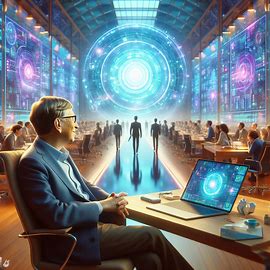Bill Gates, the co-founder of Microsoft and one of the world’s richest and most influential philanthropists, has shared his optimistic vision for the future of artificial intelligence (AI) in 2024. In a blog post published on his website GatesNotes, Gates outlined how AI can drive innovation and improve lives across various domains, such as health, education, agriculture, and energy.
Gates began his post by reflecting on how AI has transformed his own work and life in 2023, from using AI to analyze data and generate insights for his foundation, to becoming a grandfather and using AI to communicate with his grandson. He also highlighted some of the remarkable examples of AI applications that he encountered in 2023, such as:
An AI system that can diagnose malaria from blood samples with high accuracy and speed, potentially saving millions of lives in low-resource settings. AI system that can create realistic and personalized avatars for online learning, making education more accessible and engaging for students around the world.
The AI system that can optimize the design and operation of wind turbines, increasing their efficiency and reducing their environmental impact. AI system that can generate natural and expressive speech from text, enabling people with speech impairments to communicate more easily and naturally.
Gates said that AI will revolutionize health and well-being, by enhancing diagnosis, treatment, and prevention of diseases, especially infectious diseases, such as COVID-19, malaria, or tuberculosis. It said that AI will also accelerate the discovery and development of new drugs and vaccines, by analyzing large amounts of data and generating novel hypotheses and insights. Gates said that AI will also improve health care delivery and access, by providing personalized and affordable care, especially in low-resource settings.
It said that AI will transform education and learning, by personalizing and democratizing learning, and by creating new skills and opportunities. Gates said that AI will provide adaptive and interactive learning platforms, that will tailor the content, pace, and feedback, to the needs and preferences of each learner. Gates said that AI will also provide lifelong and continuous learning, that will keep up with the changing demands and trends of the labor market and the society.
They said that AI will protect and restore the environment, by monitoring and modeling climate change, biodiversity, and pollution, and by optimizing energy, water, and waste management. Gates said that AI will also promote sustainability and conservation, by enabling new and clean sources of energy, such as solar, wind, or nuclear, and by reducing greenhouse gas emissions and carbon footprint.
It said that AI will boost the economy and productivity, by creating new and better products, services, and solutions, and by improving existing ones. Gate said that AI will also enhance efficiency and quality, by automating and optimizing various tasks and processes, such as manufacturing, agriculture, or transportation. Gates said that AI will also generate new and diverse jobs and roles, that will require new and different skills and competencies.
They acknowledged that AI also poses some challenges and risks, such as ethical, social, and legal implications, data quality and security, human-AI collaboration and trust, and global cooperation and governance. Gates said that these challenges and risks can be addressed and mitigated.
Gates then proceeded to share his predictions for 2024, stating that he expects AI to continue to accelerate innovation and impact in various fields and sectors. He said that he is particularly excited about the potential of AI to address some of the biggest challenges facing humanity.
Ending the COVID-19 pandemic and preventing future outbreaks, by using AI to accelerate vaccine development, distribution, and monitoring, as well as to track and contain new variants and infections.
Fighting climate change and achieving net-zero emissions, by using AI to improve energy efficiency, reduce waste, and promote clean and renewable sources of energy.
Reducing poverty and inequality, by using AI to enhance financial inclusion, access to health care, and economic opportunities for the underserved and marginalized populations.
Advancing scientific discovery and exploration, by using AI to augment human intelligence, creativity, and curiosity, and to unlock new frontiers of knowledge and understanding.
Gates also acknowledged some of the challenges and risks associated with AI, such as ensuring its ethical, fair, and responsible use, as well as its accessibility and affordability for everyone. He emphasized the need for collaboration and dialogue among various stakeholders, such as governments, businesses, researchers, and civil society, to ensure that AI is aligned with human values, needs, and goals, and that its benefits are shared equitably and its harms are minimized.
Gates concluded his post by expressing his optimism and hope for the future of AI, stating that he believes that AI can be a force for good and a catalyst for positive change, if we make smart and strategic investments and decisions now.


Dead composed subject matter, regards for selective information.